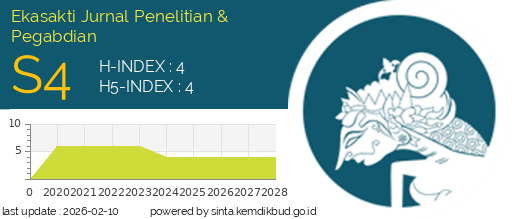ANALISIS KOMPREHENSIF TERHADAP KONSEP BELAJAR: PERSPEKTIF TEORI DAN PRAKTIK DALAM PENDIDIKAN MODERN
DOI:
https://doi.org/10.31933/ejpp.v4i2.1122Keywords:
Konsep Belajar, Teori Belajar, Pendidikan Modern, Teknologi Pendidikan, Strategi PengajaranAbstract
Penelitian ini bertujuan untuk menganalisis secara komprehensif konsep belajar dalam konteks pendidikan modern. Melalui tinjauan literatur yang ekstensif, studi ini mengeksplorasi berbagai teori belajar, faktor-faktor yang mempengaruhi proses belajar, dan implikasinya terhadap praktik pendidikan. Hasil penelitian menunjukkan bahwa konsep belajar telah berkembang dari model behavioristik sederhana menjadi pendekatan yang lebih kompleks dan holistik, mencakup aspek kognitif, sosial, dan emosional. Studi ini juga mengidentifikasi peran penting teknologi, lingkungan belajar, dan perbedaan individual dalam membentuk pengalaman belajar yang efektif. Implikasi dari temuan ini dibahas dalam konteks pengembangan kurikulum, strategi pengajaran, dan kebijakan pendidikan.
References
Bandura, A. (1977). Social learning theory. Prentice Hall.
Barrett, P., Davies, F., Zhang, Y., & Barrett, L. (2015). The impact of classroom design on pupils' learning: Final results of a holistic, multi-level analysis. Building and Environment, 89, 118-133.
Bulger, M. (2016). Personalized learning: The conversations we're not having. Data and Society, 22(1), 1-29.
Darling-Hammond, L. (2014). Next generation assessment: Moving beyond the bubble test to support 21st century learning. John Wiley & Sons.
Darling-Hammond, L., Hyler, M. E., & Gardner, M. (2017). Effective teacher professional development. Learning Policy Institute.
Flavell, J. H. (1979). Metacognition and cognitive monitoring: A new area of cognitive– developmental inquiry. American Psychologist, 34(10), 906.
Harasim, L. (2012). Learning theory and online technologies. Routledge.
Hattie, J. (2012). Visible learning for teachers: Maximizing impact on learning. Routledge. Illeris, K. (2018). Contemporary theories of learning: learning theorists... in their own words.
Routledge.
Kolb, A. Y., & Kolb, D. A. (2005). Learning styles and learning spaces: Enhancing experiential learning in higher education. Academy of Management Learning & Education, 4(2), 193-212.
Merchant, Z., Goetz, E. T., Cifuentes, L., Keeney-Kennicutt, W., & Davis, T. J. (2014). Effectiveness of virtual reality-based instruction on students' learning outcomes in K-12 and higher education: A meta-analysis. Computers & Education, 70, 29-40.
Moore, J. L., Dickson-Deane, C., & Galyen, K. (2011). e-Learning, online learning, and distance learning environments: Are they the same?. The Internet and Higher Education, 14(2), 129-135.
OECD. (2018). The future of education and skills: Education 2030. OECD Publishing.
Pekrun, R. (2014). Emotions and learning. Educational Practices Series-24. UNESCO International Bureau of Education.
Piaget, J. (1936). Origins of intelligence in the child. Routledge & Kegan Paul.
Priestley, M., & Biesta, G. (Eds.). (2013). Reinventing the curriculum: New trends in curriculum policy and practice. Bloomsbury Academic.
Ryan, R. M., & Deci, E. L. (2000). Intrinsic and extrinsic motivations: Classic definitions and new directions. Contemporary Educational Psychology, 25(1), 54-67.
Siemens, G. (2005). Connectivism: A learning theory for the digital age. International Journal of Instructional Technology and Distance Learning, 2(1), 3-10.
Siemens, G., & Long, P. (2011). Penetrating the fog: Analytics in learning and education.
EDUCAUSE Review, 46(5), 30.
Skinner, B. F. (1938). The behavior of organisms: An experimental analysis. Appleton- Century.
Vygotsky, L. S. (1978). Mind in society: The development of higher psychological processes.
Harvard University Press.
Downloads
Published
How to Cite
Issue
Section
License
Copyright (c) 2024 Abdullah Azam Ramadhan, Elvita Ayu Safitri, Intan Delia Putri, Isnaini Isnaini, Muhammad Afrizal, Nur Hikmah, Rahmi Fajriani, Salindry Salindry

This work is licensed under a Creative Commons Attribution 4.0 International License.
Penulis yang mempublikasikan manuskripnya di jurnal ini menyetujui ketentuan berikut:
- Hak cipta pada setiap artikel adalah milik penulis.
- Penulis mengakui bahwa Ekasakti Jurnal Penelitian & Pegabdian (EJPP) berhak menjadi yang pertama menerbitkan dengan lisensi Creative Commons Attribution 4.0 International (Attribution 4.0 International (CC BY 4.0) .
- Penulis dapat mengirimkan artikel secara terpisah, mengatur distribusi non-eksklusif manuskrip yang telah diterbitkan dalam jurnal ini ke versi lain (misalnya, dikirim ke repositori institusi penulis, publikasi ke dalam buku, dll.), dengan mengakui bahwa manuskrip telah diterbitkan pertama kali di Ekasakti Jurnal Penelitian & Pegabdian (EJPP).













